SWITZERLAND – Travel guide for opera, classical music and culture
SWITZERLAND: a travel guide for music fans
Visit destinations for classical music and opera art with a historical connection. Get to know exciting ideas and background information
0
OVERVIEW MAP
Here you can find the locations of all described destinations on Google Maps.
0
1
LIFE AND WORK OF ARTISTS IN SWITZERLAND
Wagner lived 16 years and Stravinsky lived 4 years in Switzerland, where both wrote significant works in the history of music. But other outstanding composers also visited the country, including one who learned to yodel.
1
2
CONCERT HALLS AND OPERA HOUSES
The country has a high density of opera houses and concert halls. Among them, the Zurich Opera stands out. 3 important works were premiered there.
2
3
MUSEUM
Tribschen became one of the most important memorials of Richard Wagner ever.
3
4
CHURCHES
Mendelssohn played on many organs of Swiss churches and Wagner married in one.
4
5
MONUMENTS
Two monuments with a beautiful view
5
6
HOUSES AND APARTMENTS OF COMPOSERS
Where Puccini, Wagner and Stravinsky dwelt
6
7
HOTELS
Where Richard Wagner first read from his Ring and Felix Mendelssohn witnessed the world-famous sunrise of the place.
7
8
MUSIC PIECES RELATING TO SWITZERLAND
Twice Wagner, once Rossini
8
MAP OF THE DESTINATIONS OF THE TRAVEL GUIDE SWITZERLAND
Zoom in for destinations in SWITZERLAND:
LIFE AND WORK OF ARTISTS IN SWITZERLAND
Richard Wagner
First asylum in Zurich
Wagner had to flee headlong from revolutionary Dresden to Switzerland with his wife Minna. His Zurich exile lasted from 1849-1859, where he befriended the German industrialist couple Wesendonck, who became his patrons. His stormy love for the patron’s wife Mathilde Wesendonck inspired him to write his great love opera “Tristan und Isolde“.
Second asylum in Zurich
Expelled by the Munich government, Ludwig II financed Wagner’s asylum on the southern edge of Lucerne. Wagner lived there with his wife Cosima from 1866 to 1872. The young Friedrich Nietzsche, professor at the University of Basel, frequently visited the Wagners, and Ludwig II also paid his respects (incognito) to the master. Wagner had already been in Lucerne before. He composed the third act of his work “Tristan & Isolde” in the Hotel Schweizerhof 7 years earlier. He arrived with his Érard grand piano and occupied a suite for two months.
Richard and Cosima were married in St. Matthew’s Church and she bore him three children in Tribschen. It is possible that the generous Wagner also enabled the housekeeper Verena Weidman to have an offspring; the child is said to have been very much like Richard. Wagner also enjoyed the excursions to the neighboring mountains in Lucerne, especially Mount Pilatus.
LINK TO THE COMPLETE WAGNER BIOGRAPHY
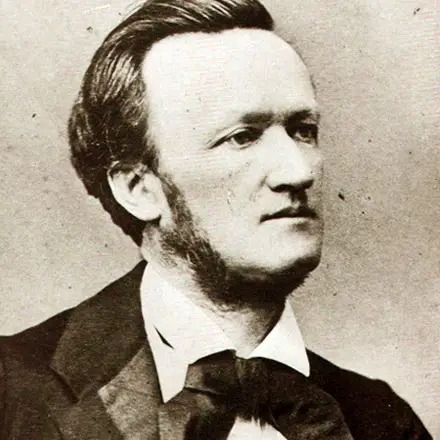
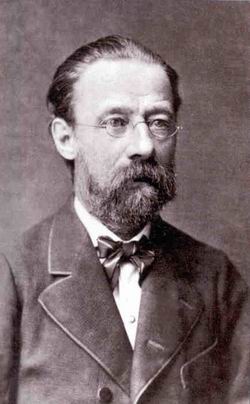
Felix Mendelssohn Bartholdy
Switzerland explored on foot
On four occasions, Mendelssohn traveled through Switzerland for a longer period of time, probably covering approximately one thousand kilometers on foot. The first time as a 14-year-old with his family and several servants coming from Berlin, another time during the summer of the century with great floods and the last time deeply saddened after he had learned of the death of his beloved sister Fanny. Mendelssohn wandered all over Switzerland, some places were dear to his heart and he visited them several times.
He even learned to yodel
From his correspondence we learn that he learned some yodeling in Switzerland, which “sounds rough in the room, but outside, in the early morning and bright weather, to the ringing of the cows in the valley, beautiful and enthusiastic”.
Mendelssohn was also a talented draftsman; a total of more than 300 works of art by him have survived, several dozen of them with motifs from Switzerland.
TO THE COMPLETE MENDELSSOHN BIOGRAPHY
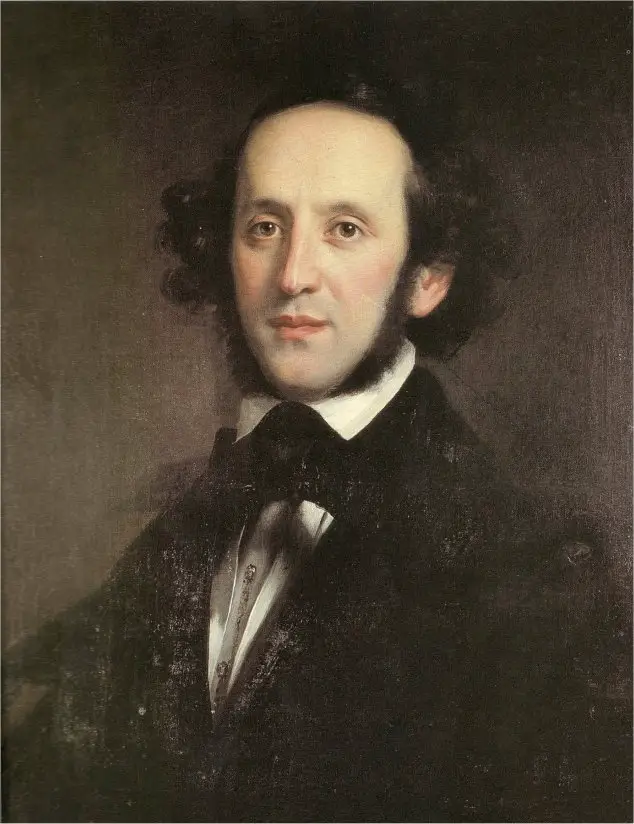
Sergey Rachmaninov
Exiled Russian
Rachmaninov left Russia as a renowned musician in the wake of the revolutionary turmoil. He became a successful and wealthy concert pianist in the United States. However, due to his many travels, his compositional activities came to a standstill, and he could not make friends with American culture. So he decided to return to Europe with his wife and they found an estate in Switzerland on Lake Lucerne where they could live in the desired seclusion.
They had a modern Bauhaus-style house built in Hertenstein, which still exists almost unchanged today. The Rachmaninovs spent here the years 1931-1939 (especially the summer months). Rachmaninov composed his 3rd symphony and variation works here, among others. With the outbreak of World War II, the Rachmaninovs left Switzerland again for the USA.
The building still belongs to the heirs, although a conflict has arisen over its use following the death of an heir in 2012. The building is open only on certain occasions.
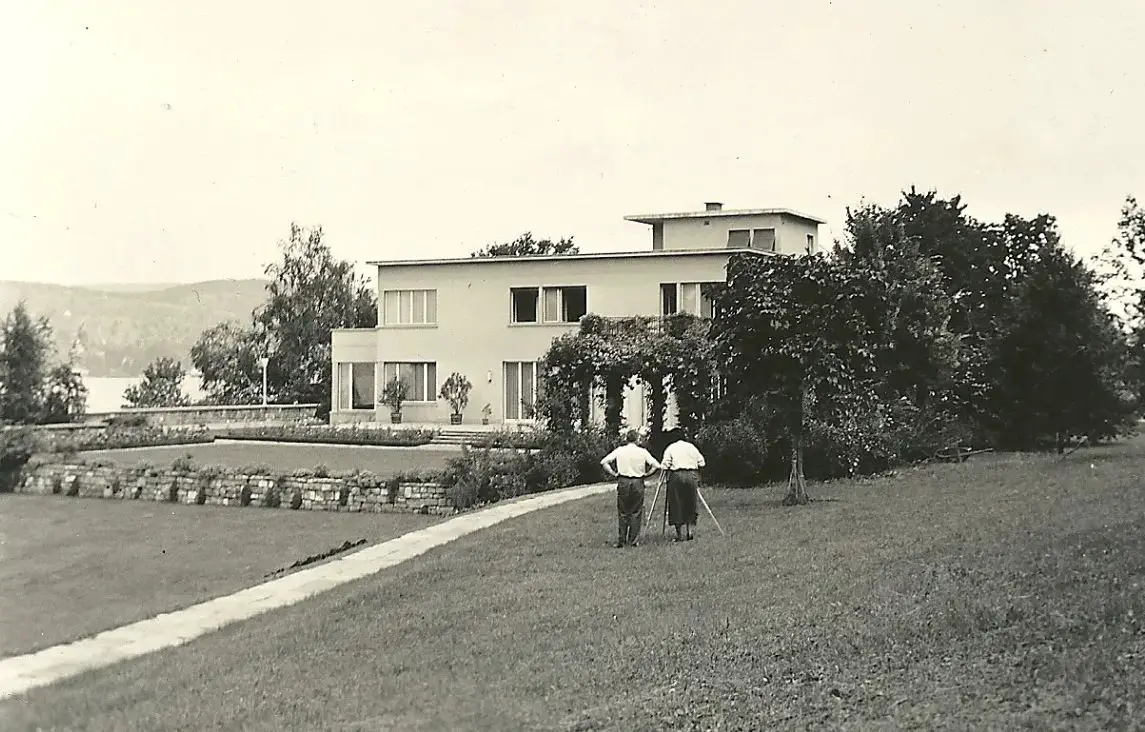
Igor Stravinsky
Work on the balettes for the “ballets Russes
With the first work commissioned for Paris, the Firebird, Stravinsky changed his winter residence to Lake Geneva. On the one hand because his wife appreciated this mild place due to health problems and on the other hand because the impresario of the Ballets Russes, Dhiagilev, had temporarily set up camp in Lausanne.
Collaboration with Ramuz and Ansermet
Stravinsky worked on many important works during this time (Sacré du Printemps, les noces, l’histoire du Soldat, etc.) and became friends with the conductor Ernest Ansermet, who became an important promoter of his works, and with the writer Ramuz, who wrote the text for L’histoire du Soldat, based on a Russian tale.
TO THE COMPLETE BIOGRAPHY OF STRAVINSKY
With Ramuz (left):
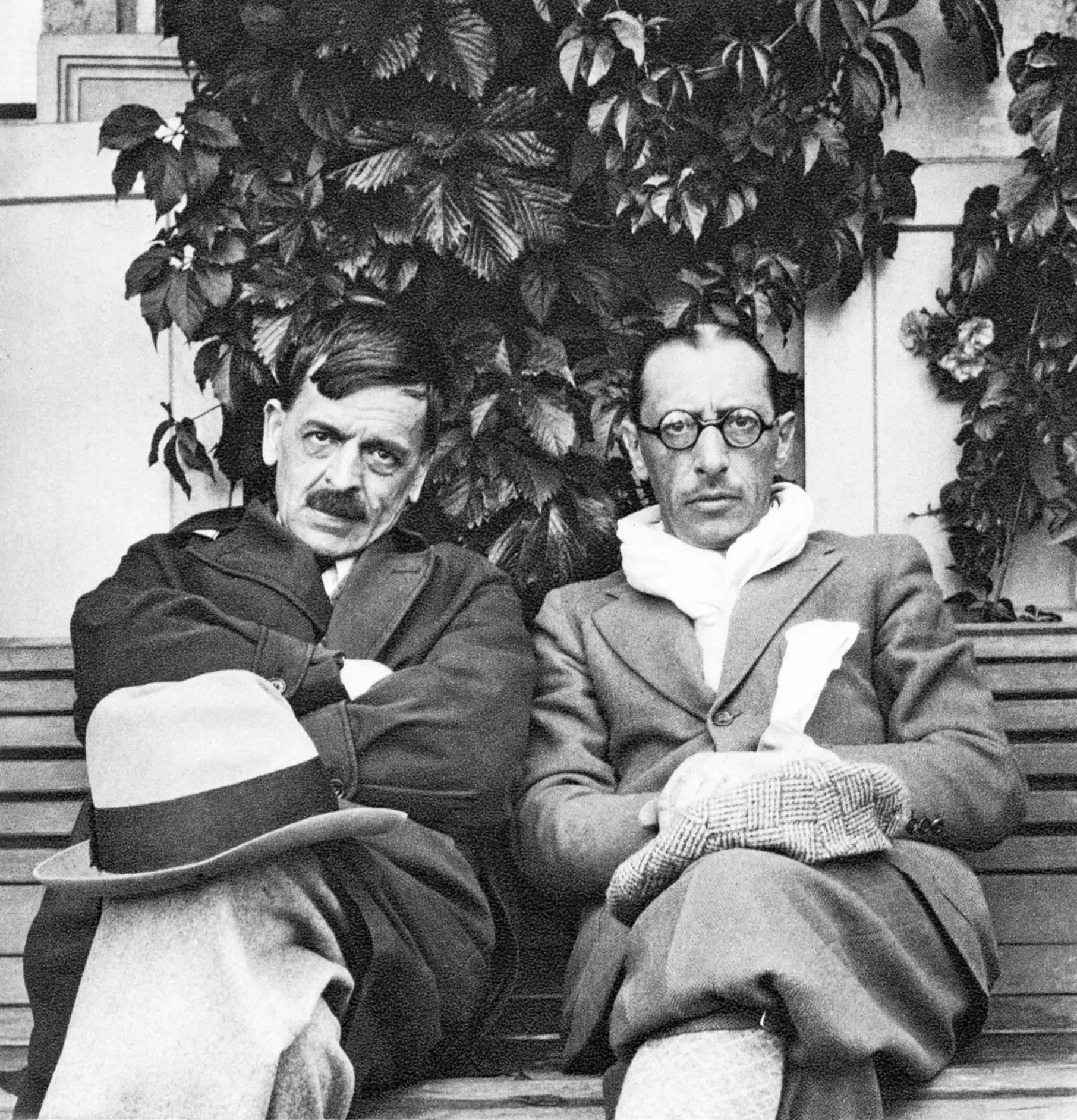
Giacomo Puccini
Summer retreat in a small village of Ticino
Das kleine Tessiner Dorf Vacallo bei Chiasso hatte 1892 die Ehre zwei Grosse der Opernmusik zu beherbergen. Puccini begab sich zwischen 1886 und 1892 mehrere Male in die Sommerfrische dieses Dorfes und mietete ein Haus. Schräg gegenüber, in Sichtweite befand sich Ruggiero Leoncavallo an der Arbeit im Hotel der heutigen «Osteria del Teatro». Beide hängten Plakate als Zeichen ihrer Präsenz aus dem Fenster, Leoncavallo einen Clown als Zeichen des soeben von Toscanini uraufgeführten «Pagliacci» und Puccini eine Faust als Zeichen von Manon (Faust = italienisch «Manone»), da er an der Arbeit von «Manon Lescaut» war, Leoncavallo schrieb sogar ein paar Verse für seinen Kollegen.
LINK ZUR KOMPLETTEN PUCCINI BIOGRAFIE
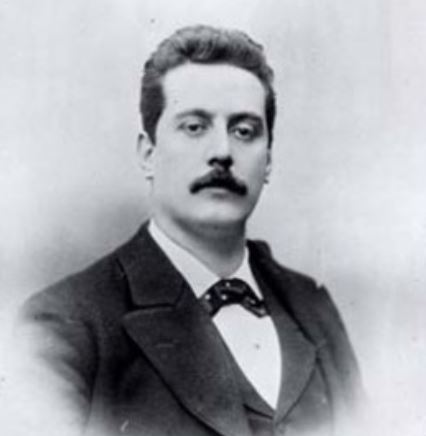
Gioachino Rossini
His Guillaume Tell: a monument for Switzerland
The famous fourth act of Rossini’s opera “Guillaume Tell” with the ballet of the soldiers (“Pas des Soldats”) and the apple shot (“Sois-immobile”) takes place in the market place of Altdorf. Rossini himself had never seen the Central-Switzerland, but knew Geneva and a part of the Alps of western Switzerland. For the premiere at the Grand Opéra in Paris, they sent the stage designer Cicéri to Central Switzerland, where he made sketches for the stage sets.[/sc_fs_faq]
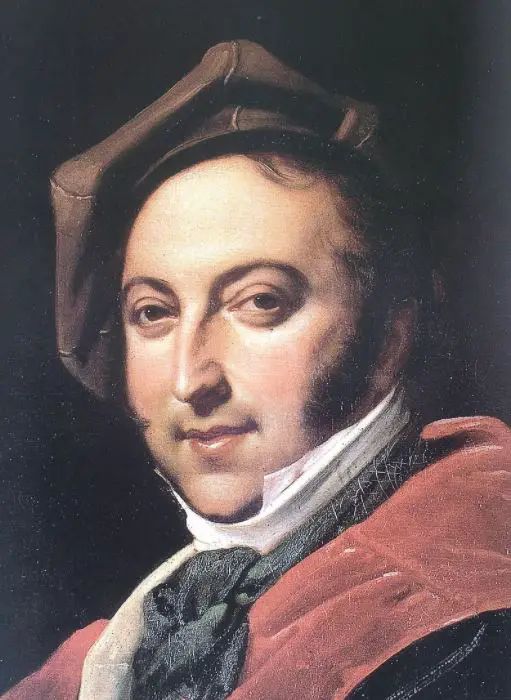
Johannes Brahms
At the publisher’s in Winterthur
Johannes Brahms had various points of contact with Switzerland. One counted 14 visits to Switzerland. First, he found a publisher in Winterthur in Jakob-Melchior-Rieter. A German publisher had rejected him and so he had the German Requiem, among other works, published by Melchior-Rieter.
Conducting and composing in Zurich
Secondly, Brahms had friends in Zurich (e.g. the conductor Hegar and the physician Billroth).He also spent a few summer weeks there in Rüschlikon on Lake Zurich, composing on his Liebeslieder waltz. In 1895 he conducted at the opening of the magnificent Tonhalle Zurich.
Summer retreat on Lake Thun
And finally, Brahms spent three summer holidays on Lake Thun, where, among other things, the famous alphorn theme came to his ears and he incorporated it into his first symphony.
Brahms at Lake Thun:
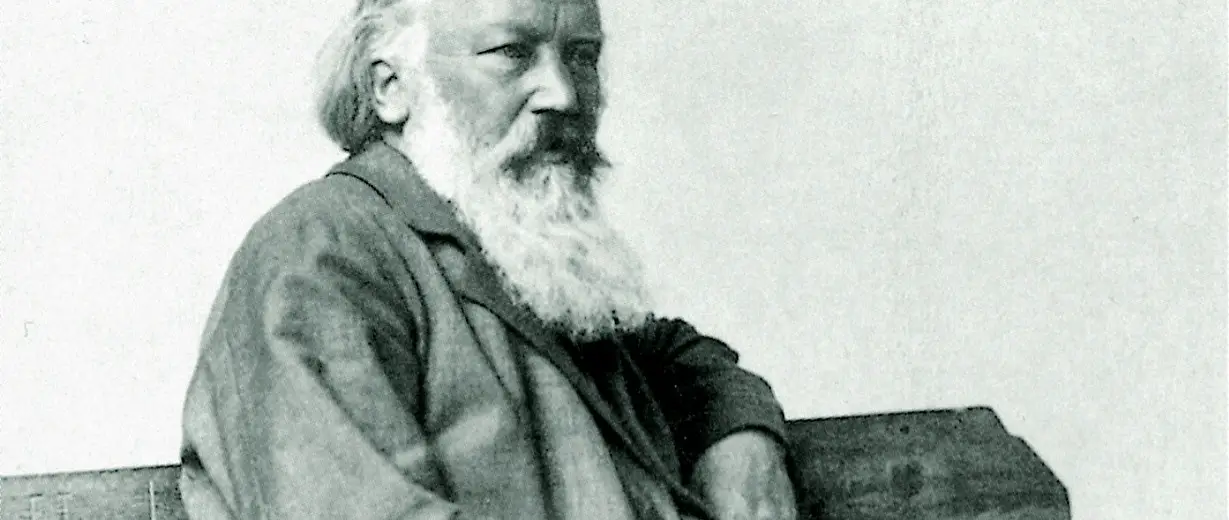
CONCERT HALLS AND OPERA HOUSES
Richard Wagner
First asylum in Zurich
Wagner had to flee headlong from revolutionary Dresden to Switzerland with his wife Minna. His Zurich exile lasted from 1849-1859, where he befriended the German industrialist couple Wesendonck, who became his patrons. His stormy love for the patron’s wife Mathilde Wesendonck inspired him to write his great love opera “Tristan und Isolde“.
Second asylum in Zurich
Expelled by the Munich government, Ludwig II financed Wagner’s asylum on the southern edge of Lucerne. Wagner lived there with his wife Cosima from 1866 to 1872. The young Friedrich Nietzsche, professor at the University of Basel, frequently visited the Wagners, and Ludwig II also paid his respects (incognito) to the master. Wagner had already been in Lucerne before. He composed the third act of his work “Tristan & Isolde” in the Hotel Schweizerhof 7 years earlier. He arrived with his Érard grand piano and occupied a suite for two months.
Richard and Cosima were married in St. Matthew’s Church and she bore him three children in Tribschen. It is possible that the generous Wagner also enabled the housekeeper Verena Weidman to have an offspring; the child is said to have been very much like Richard. Wagner also enjoyed the excursions to the neighboring mountains in Lucerne, especially Mount Pilatus.
LINK TO THE COMPLETE WAGNER BIOGRAPHY


Felix Mendelssohn Bartholdy
Switzerland explored on foot
On four occasions, Mendelssohn traveled through Switzerland for a longer period of time, probably covering approximately one thousand kilometers on foot. The first time as a 14-year-old with his family and several servants coming from Berlin, another time during the summer of the century with great floods and the last time deeply saddened after he had learned of the death of his beloved sister Fanny. Mendelssohn wandered all over Switzerland, some places were dear to his heart and he visited them several times.
He even learned to yodel
From his correspondence we learn that he learned some yodeling in Switzerland, which “sounds rough in the room, but outside, in the early morning and bright weather, to the ringing of the cows in the valley, beautiful and enthusiastic”.
Mendelssohn was also a talented draftsman; a total of more than 300 works of art by him have survived, several dozen of them with motifs from Switzerland.
TO THE COMPLETE MENDELSSOHN BIOGRAPHY

Sergey Rachmaninov
Exiled Russian
Rachmaninov left Russia as a renowned musician in the wake of the revolutionary turmoil. He became a successful and wealthy concert pianist in the United States. However, due to his many travels, his compositional activities came to a standstill, and he could not make friends with American culture. So he decided to return to Europe with his wife and they found an estate in Switzerland on Lake Lucerne where they could live in the desired seclusion.
They had a modern Bauhaus-style house built in Hertenstein, which still exists almost unchanged today. The Rachmaninovs spent here the years 1931-1939 (especially the summer months). Rachmaninov composed his 3rd symphony and variation works here, among others. With the outbreak of World War II, the Rachmaninovs left Switzerland again for the USA.
The building still belongs to the heirs, although a conflict has arisen over its use following the death of an heir in 2012. The building is open only on certain occasions.

Igor Stravinsky
Work on the balettes for the “ballets Russes
With the first work commissioned for Paris, the Firebird, Stravinsky changed his winter residence to Lake Geneva. On the one hand because his wife appreciated this mild place due to health problems and on the other hand because the impresario of the Ballets Russes, Dhiagilev, had temporarily set up camp in Lausanne.
Collaboration with Ramuz and Ansermet
Stravinsky worked on many important works during this time (Sacré du Printemps, les noces, l’histoire du Soldat, etc.) and became friends with the conductor Ernest Ansermet, who became an important promoter of his works, and with the writer Ramuz, who wrote the text for L’histoire du Soldat, based on a Russian tale.
TO THE COMPLETE BIOGRAPHY OF STRAVINSKY
With Ramuz (left):

Giacomo Puccini
Summer retreat in a small village of Ticino
Das kleine Tessiner Dorf Vacallo bei Chiasso hatte 1892 die Ehre zwei Grosse der Opernmusik zu beherbergen. Puccini begab sich zwischen 1886 und 1892 mehrere Male in die Sommerfrische dieses Dorfes und mietete ein Haus. Schräg gegenüber, in Sichtweite befand sich Ruggiero Leoncavallo an der Arbeit im Hotel der heutigen «Osteria del Teatro». Beide hängten Plakate als Zeichen ihrer Präsenz aus dem Fenster, Leoncavallo einen Clown als Zeichen des soeben von Toscanini uraufgeführten «Pagliacci» und Puccini eine Faust als Zeichen von Manon (Faust = italienisch «Manone»), da er an der Arbeit von «Manon Lescaut» war, Leoncavallo schrieb sogar ein paar Verse für seinen Kollegen.
LINK ZUR KOMPLETTEN PUCCINI BIOGRAFIE

Gioachino Rossini
His Guillaume Tell: a monument for Switzerland
The famous fourth act of Rossini’s opera “Guillaume Tell” with the ballet of the soldiers (“Pas des Soldats”) and the apple shot (“Sois-immobile”) takes place in the market place of Altdorf. Rossini himself had never seen the Central-Switzerland, but knew Geneva and a part of the Alps of western Switzerland. For the premiere at the Grand Opéra in Paris, they sent the stage designer Cicéri to Central Switzerland, where he made sketches for the stage sets.[/sc_fs_faq]

Johannes Brahms
At the publisher’s in Winterthur
Johannes Brahms had various points of contact with Switzerland. One counted 14 visits to Switzerland. First, he found a publisher in Winterthur in Jakob-Melchior-Rieter. A German publisher had rejected him and so he had the German Requiem, among other works, published by Melchior-Rieter.
Conducting and composing in Zurich
Secondly, Brahms had friends in Zurich (e.g. the conductor Hegar and the physician Billroth).He also spent a few summer weeks there in Rüschlikon on Lake Zurich, composing on his Liebeslieder waltz. In 1895 he conducted at the opening of the magnificent Tonhalle Zurich.
Summer retreat on Lake Thun
And finally, Brahms spent three summer holidays on Lake Thun, where, among other things, the famous alphorn theme came to his ears and he incorporated it into his first symphony.
Brahms at Lake Thun:

MUSEUM
Richard Wagner
First asylum in Zurich
Wagner had to flee headlong from revolutionary Dresden to Switzerland with his wife Minna. His Zurich exile lasted from 1849-1859, where he befriended the German industrialist couple Wesendonck, who became his patrons. His stormy love for the patron’s wife Mathilde Wesendonck inspired him to write his great love opera “Tristan und Isolde“.
Second asylum in Zurich
Expelled by the Munich government, Ludwig II financed Wagner’s asylum on the southern edge of Lucerne. Wagner lived there with his wife Cosima from 1866 to 1872. The young Friedrich Nietzsche, professor at the University of Basel, frequently visited the Wagners, and Ludwig II also paid his respects (incognito) to the master. Wagner had already been in Lucerne before. He composed the third act of his work “Tristan & Isolde” in the Hotel Schweizerhof 7 years earlier. He arrived with his Érard grand piano and occupied a suite for two months.
Richard and Cosima were married in St. Matthew’s Church and she bore him three children in Tribschen. It is possible that the generous Wagner also enabled the housekeeper Verena Weidman to have an offspring; the child is said to have been very much like Richard. Wagner also enjoyed the excursions to the neighboring mountains in Lucerne, especially Mount Pilatus.
LINK TO THE COMPLETE WAGNER BIOGRAPHY


Felix Mendelssohn Bartholdy
Switzerland explored on foot
On four occasions, Mendelssohn traveled through Switzerland for a longer period of time, probably covering approximately one thousand kilometers on foot. The first time as a 14-year-old with his family and several servants coming from Berlin, another time during the summer of the century with great floods and the last time deeply saddened after he had learned of the death of his beloved sister Fanny. Mendelssohn wandered all over Switzerland, some places were dear to his heart and he visited them several times.
He even learned to yodel
From his correspondence we learn that he learned some yodeling in Switzerland, which “sounds rough in the room, but outside, in the early morning and bright weather, to the ringing of the cows in the valley, beautiful and enthusiastic”.
Mendelssohn was also a talented draftsman; a total of more than 300 works of art by him have survived, several dozen of them with motifs from Switzerland.
TO THE COMPLETE MENDELSSOHN BIOGRAPHY

Sergey Rachmaninov
Exiled Russian
Rachmaninov left Russia as a renowned musician in the wake of the revolutionary turmoil. He became a successful and wealthy concert pianist in the United States. However, due to his many travels, his compositional activities came to a standstill, and he could not make friends with American culture. So he decided to return to Europe with his wife and they found an estate in Switzerland on Lake Lucerne where they could live in the desired seclusion.
They had a modern Bauhaus-style house built in Hertenstein, which still exists almost unchanged today. The Rachmaninovs spent here the years 1931-1939 (especially the summer months). Rachmaninov composed his 3rd symphony and variation works here, among others. With the outbreak of World War II, the Rachmaninovs left Switzerland again for the USA.
The building still belongs to the heirs, although a conflict has arisen over its use following the death of an heir in 2012. The building is open only on certain occasions.

Igor Stravinsky
Work on the balettes for the “ballets Russes
With the first work commissioned for Paris, the Firebird, Stravinsky changed his winter residence to Lake Geneva. On the one hand because his wife appreciated this mild place due to health problems and on the other hand because the impresario of the Ballets Russes, Dhiagilev, had temporarily set up camp in Lausanne.
Collaboration with Ramuz and Ansermet
Stravinsky worked on many important works during this time (Sacré du Printemps, les noces, l’histoire du Soldat, etc.) and became friends with the conductor Ernest Ansermet, who became an important promoter of his works, and with the writer Ramuz, who wrote the text for L’histoire du Soldat, based on a Russian tale.
TO THE COMPLETE BIOGRAPHY OF STRAVINSKY
With Ramuz (left):

Giacomo Puccini
Summer retreat in a small village of Ticino
Das kleine Tessiner Dorf Vacallo bei Chiasso hatte 1892 die Ehre zwei Grosse der Opernmusik zu beherbergen. Puccini begab sich zwischen 1886 und 1892 mehrere Male in die Sommerfrische dieses Dorfes und mietete ein Haus. Schräg gegenüber, in Sichtweite befand sich Ruggiero Leoncavallo an der Arbeit im Hotel der heutigen «Osteria del Teatro». Beide hängten Plakate als Zeichen ihrer Präsenz aus dem Fenster, Leoncavallo einen Clown als Zeichen des soeben von Toscanini uraufgeführten «Pagliacci» und Puccini eine Faust als Zeichen von Manon (Faust = italienisch «Manone»), da er an der Arbeit von «Manon Lescaut» war, Leoncavallo schrieb sogar ein paar Verse für seinen Kollegen.
LINK ZUR KOMPLETTEN PUCCINI BIOGRAFIE

Gioachino Rossini
His Guillaume Tell: a monument for Switzerland
The famous fourth act of Rossini’s opera “Guillaume Tell” with the ballet of the soldiers (“Pas des Soldats”) and the apple shot (“Sois-immobile”) takes place in the market place of Altdorf. Rossini himself had never seen the Central-Switzerland, but knew Geneva and a part of the Alps of western Switzerland. For the premiere at the Grand Opéra in Paris, they sent the stage designer Cicéri to Central Switzerland, where he made sketches for the stage sets.[/sc_fs_faq]

Johannes Brahms
At the publisher’s in Winterthur
Johannes Brahms had various points of contact with Switzerland. One counted 14 visits to Switzerland. First, he found a publisher in Winterthur in Jakob-Melchior-Rieter. A German publisher had rejected him and so he had the German Requiem, among other works, published by Melchior-Rieter.
Conducting and composing in Zurich
Secondly, Brahms had friends in Zurich (e.g. the conductor Hegar and the physician Billroth).He also spent a few summer weeks there in Rüschlikon on Lake Zurich, composing on his Liebeslieder waltz. In 1895 he conducted at the opening of the magnificent Tonhalle Zurich.
Summer retreat on Lake Thun
And finally, Brahms spent three summer holidays on Lake Thun, where, among other things, the famous alphorn theme came to his ears and he incorporated it into his first symphony.
Brahms at Lake Thun:

CHURCHES
Richard Wagner
First asylum in Zurich
Wagner had to flee headlong from revolutionary Dresden to Switzerland with his wife Minna. His Zurich exile lasted from 1849-1859, where he befriended the German industrialist couple Wesendonck, who became his patrons. His stormy love for the patron’s wife Mathilde Wesendonck inspired him to write his great love opera “Tristan und Isolde“.
Second asylum in Zurich
Expelled by the Munich government, Ludwig II financed Wagner’s asylum on the southern edge of Lucerne. Wagner lived there with his wife Cosima from 1866 to 1872. The young Friedrich Nietzsche, professor at the University of Basel, frequently visited the Wagners, and Ludwig II also paid his respects (incognito) to the master. Wagner had already been in Lucerne before. He composed the third act of his work “Tristan & Isolde” in the Hotel Schweizerhof 7 years earlier. He arrived with his Érard grand piano and occupied a suite for two months.
Richard and Cosima were married in St. Matthew’s Church and she bore him three children in Tribschen. It is possible that the generous Wagner also enabled the housekeeper Verena Weidman to have an offspring; the child is said to have been very much like Richard. Wagner also enjoyed the excursions to the neighboring mountains in Lucerne, especially Mount Pilatus.
LINK TO THE COMPLETE WAGNER BIOGRAPHY


Felix Mendelssohn Bartholdy
Switzerland explored on foot
On four occasions, Mendelssohn traveled through Switzerland for a longer period of time, probably covering approximately one thousand kilometers on foot. The first time as a 14-year-old with his family and several servants coming from Berlin, another time during the summer of the century with great floods and the last time deeply saddened after he had learned of the death of his beloved sister Fanny. Mendelssohn wandered all over Switzerland, some places were dear to his heart and he visited them several times.
He even learned to yodel
From his correspondence we learn that he learned some yodeling in Switzerland, which “sounds rough in the room, but outside, in the early morning and bright weather, to the ringing of the cows in the valley, beautiful and enthusiastic”.
Mendelssohn was also a talented draftsman; a total of more than 300 works of art by him have survived, several dozen of them with motifs from Switzerland.
TO THE COMPLETE MENDELSSOHN BIOGRAPHY

Sergey Rachmaninov
Exiled Russian
Rachmaninov left Russia as a renowned musician in the wake of the revolutionary turmoil. He became a successful and wealthy concert pianist in the United States. However, due to his many travels, his compositional activities came to a standstill, and he could not make friends with American culture. So he decided to return to Europe with his wife and they found an estate in Switzerland on Lake Lucerne where they could live in the desired seclusion.
They had a modern Bauhaus-style house built in Hertenstein, which still exists almost unchanged today. The Rachmaninovs spent here the years 1931-1939 (especially the summer months). Rachmaninov composed his 3rd symphony and variation works here, among others. With the outbreak of World War II, the Rachmaninovs left Switzerland again for the USA.
The building still belongs to the heirs, although a conflict has arisen over its use following the death of an heir in 2012. The building is open only on certain occasions.

Igor Stravinsky
Work on the balettes for the “ballets Russes
With the first work commissioned for Paris, the Firebird, Stravinsky changed his winter residence to Lake Geneva. On the one hand because his wife appreciated this mild place due to health problems and on the other hand because the impresario of the Ballets Russes, Dhiagilev, had temporarily set up camp in Lausanne.
Collaboration with Ramuz and Ansermet
Stravinsky worked on many important works during this time (Sacré du Printemps, les noces, l’histoire du Soldat, etc.) and became friends with the conductor Ernest Ansermet, who became an important promoter of his works, and with the writer Ramuz, who wrote the text for L’histoire du Soldat, based on a Russian tale.
TO THE COMPLETE BIOGRAPHY OF STRAVINSKY
With Ramuz (left):

Giacomo Puccini
Summer retreat in a small village of Ticino
Das kleine Tessiner Dorf Vacallo bei Chiasso hatte 1892 die Ehre zwei Grosse der Opernmusik zu beherbergen. Puccini begab sich zwischen 1886 und 1892 mehrere Male in die Sommerfrische dieses Dorfes und mietete ein Haus. Schräg gegenüber, in Sichtweite befand sich Ruggiero Leoncavallo an der Arbeit im Hotel der heutigen «Osteria del Teatro». Beide hängten Plakate als Zeichen ihrer Präsenz aus dem Fenster, Leoncavallo einen Clown als Zeichen des soeben von Toscanini uraufgeführten «Pagliacci» und Puccini eine Faust als Zeichen von Manon (Faust = italienisch «Manone»), da er an der Arbeit von «Manon Lescaut» war, Leoncavallo schrieb sogar ein paar Verse für seinen Kollegen.
LINK ZUR KOMPLETTEN PUCCINI BIOGRAFIE

Gioachino Rossini
His Guillaume Tell: a monument for Switzerland
The famous fourth act of Rossini’s opera “Guillaume Tell” with the ballet of the soldiers (“Pas des Soldats”) and the apple shot (“Sois-immobile”) takes place in the market place of Altdorf. Rossini himself had never seen the Central-Switzerland, but knew Geneva and a part of the Alps of western Switzerland. For the premiere at the Grand Opéra in Paris, they sent the stage designer Cicéri to Central Switzerland, where he made sketches for the stage sets.[/sc_fs_faq]

Johannes Brahms
At the publisher’s in Winterthur
Johannes Brahms had various points of contact with Switzerland. One counted 14 visits to Switzerland. First, he found a publisher in Winterthur in Jakob-Melchior-Rieter. A German publisher had rejected him and so he had the German Requiem, among other works, published by Melchior-Rieter.
Conducting and composing in Zurich
Secondly, Brahms had friends in Zurich (e.g. the conductor Hegar and the physician Billroth).He also spent a few summer weeks there in Rüschlikon on Lake Zurich, composing on his Liebeslieder waltz. In 1895 he conducted at the opening of the magnificent Tonhalle Zurich.
Summer retreat on Lake Thun
And finally, Brahms spent three summer holidays on Lake Thun, where, among other things, the famous alphorn theme came to his ears and he incorporated it into his first symphony.
Brahms at Lake Thun:

MONUMENTS
Richard Wagner
First asylum in Zurich
Wagner had to flee headlong from revolutionary Dresden to Switzerland with his wife Minna. His Zurich exile lasted from 1849-1859, where he befriended the German industrialist couple Wesendonck, who became his patrons. His stormy love for the patron’s wife Mathilde Wesendonck inspired him to write his great love opera “Tristan und Isolde“.
Second asylum in Zurich
Expelled by the Munich government, Ludwig II financed Wagner’s asylum on the southern edge of Lucerne. Wagner lived there with his wife Cosima from 1866 to 1872. The young Friedrich Nietzsche, professor at the University of Basel, frequently visited the Wagners, and Ludwig II also paid his respects (incognito) to the master. Wagner had already been in Lucerne before. He composed the third act of his work “Tristan & Isolde” in the Hotel Schweizerhof 7 years earlier. He arrived with his Érard grand piano and occupied a suite for two months.
Richard and Cosima were married in St. Matthew’s Church and she bore him three children in Tribschen. It is possible that the generous Wagner also enabled the housekeeper Verena Weidman to have an offspring; the child is said to have been very much like Richard. Wagner also enjoyed the excursions to the neighboring mountains in Lucerne, especially Mount Pilatus.
LINK TO THE COMPLETE WAGNER BIOGRAPHY


Felix Mendelssohn Bartholdy
Switzerland explored on foot
On four occasions, Mendelssohn traveled through Switzerland for a longer period of time, probably covering approximately one thousand kilometers on foot. The first time as a 14-year-old with his family and several servants coming from Berlin, another time during the summer of the century with great floods and the last time deeply saddened after he had learned of the death of his beloved sister Fanny. Mendelssohn wandered all over Switzerland, some places were dear to his heart and he visited them several times.
He even learned to yodel
From his correspondence we learn that he learned some yodeling in Switzerland, which “sounds rough in the room, but outside, in the early morning and bright weather, to the ringing of the cows in the valley, beautiful and enthusiastic”.
Mendelssohn was also a talented draftsman; a total of more than 300 works of art by him have survived, several dozen of them with motifs from Switzerland.
TO THE COMPLETE MENDELSSOHN BIOGRAPHY

Sergey Rachmaninov
Exiled Russian
Rachmaninov left Russia as a renowned musician in the wake of the revolutionary turmoil. He became a successful and wealthy concert pianist in the United States. However, due to his many travels, his compositional activities came to a standstill, and he could not make friends with American culture. So he decided to return to Europe with his wife and they found an estate in Switzerland on Lake Lucerne where they could live in the desired seclusion.
They had a modern Bauhaus-style house built in Hertenstein, which still exists almost unchanged today. The Rachmaninovs spent here the years 1931-1939 (especially the summer months). Rachmaninov composed his 3rd symphony and variation works here, among others. With the outbreak of World War II, the Rachmaninovs left Switzerland again for the USA.
The building still belongs to the heirs, although a conflict has arisen over its use following the death of an heir in 2012. The building is open only on certain occasions.

Igor Stravinsky
Work on the balettes for the “ballets Russes
With the first work commissioned for Paris, the Firebird, Stravinsky changed his winter residence to Lake Geneva. On the one hand because his wife appreciated this mild place due to health problems and on the other hand because the impresario of the Ballets Russes, Dhiagilev, had temporarily set up camp in Lausanne.
Collaboration with Ramuz and Ansermet
Stravinsky worked on many important works during this time (Sacré du Printemps, les noces, l’histoire du Soldat, etc.) and became friends with the conductor Ernest Ansermet, who became an important promoter of his works, and with the writer Ramuz, who wrote the text for L’histoire du Soldat, based on a Russian tale.
TO THE COMPLETE BIOGRAPHY OF STRAVINSKY
With Ramuz (left):

Giacomo Puccini
Summer retreat in a small village of Ticino
Das kleine Tessiner Dorf Vacallo bei Chiasso hatte 1892 die Ehre zwei Grosse der Opernmusik zu beherbergen. Puccini begab sich zwischen 1886 und 1892 mehrere Male in die Sommerfrische dieses Dorfes und mietete ein Haus. Schräg gegenüber, in Sichtweite befand sich Ruggiero Leoncavallo an der Arbeit im Hotel der heutigen «Osteria del Teatro». Beide hängten Plakate als Zeichen ihrer Präsenz aus dem Fenster, Leoncavallo einen Clown als Zeichen des soeben von Toscanini uraufgeführten «Pagliacci» und Puccini eine Faust als Zeichen von Manon (Faust = italienisch «Manone»), da er an der Arbeit von «Manon Lescaut» war, Leoncavallo schrieb sogar ein paar Verse für seinen Kollegen.
LINK ZUR KOMPLETTEN PUCCINI BIOGRAFIE

Gioachino Rossini
His Guillaume Tell: a monument for Switzerland
The famous fourth act of Rossini’s opera “Guillaume Tell” with the ballet of the soldiers (“Pas des Soldats”) and the apple shot (“Sois-immobile”) takes place in the market place of Altdorf. Rossini himself had never seen the Central-Switzerland, but knew Geneva and a part of the Alps of western Switzerland. For the premiere at the Grand Opéra in Paris, they sent the stage designer Cicéri to Central Switzerland, where he made sketches for the stage sets.[/sc_fs_faq]

Johannes Brahms
At the publisher’s in Winterthur
Johannes Brahms had various points of contact with Switzerland. One counted 14 visits to Switzerland. First, he found a publisher in Winterthur in Jakob-Melchior-Rieter. A German publisher had rejected him and so he had the German Requiem, among other works, published by Melchior-Rieter.
Conducting and composing in Zurich
Secondly, Brahms had friends in Zurich (e.g. the conductor Hegar and the physician Billroth).He also spent a few summer weeks there in Rüschlikon on Lake Zurich, composing on his Liebeslieder waltz. In 1895 he conducted at the opening of the magnificent Tonhalle Zurich.
Summer retreat on Lake Thun
And finally, Brahms spent three summer holidays on Lake Thun, where, among other things, the famous alphorn theme came to his ears and he incorporated it into his first symphony.
Brahms at Lake Thun:

HOUSES OF ARTISTS
Richard Wagner
First asylum in Zurich
Wagner had to flee headlong from revolutionary Dresden to Switzerland with his wife Minna. His Zurich exile lasted from 1849-1859, where he befriended the German industrialist couple Wesendonck, who became his patrons. His stormy love for the patron’s wife Mathilde Wesendonck inspired him to write his great love opera “Tristan und Isolde“.
Second asylum in Zurich
Expelled by the Munich government, Ludwig II financed Wagner’s asylum on the southern edge of Lucerne. Wagner lived there with his wife Cosima from 1866 to 1872. The young Friedrich Nietzsche, professor at the University of Basel, frequently visited the Wagners, and Ludwig II also paid his respects (incognito) to the master. Wagner had already been in Lucerne before. He composed the third act of his work “Tristan & Isolde” in the Hotel Schweizerhof 7 years earlier. He arrived with his Érard grand piano and occupied a suite for two months.
Richard and Cosima were married in St. Matthew’s Church and she bore him three children in Tribschen. It is possible that the generous Wagner also enabled the housekeeper Verena Weidman to have an offspring; the child is said to have been very much like Richard. Wagner also enjoyed the excursions to the neighboring mountains in Lucerne, especially Mount Pilatus.
LINK TO THE COMPLETE WAGNER BIOGRAPHY


Felix Mendelssohn Bartholdy
Switzerland explored on foot
On four occasions, Mendelssohn traveled through Switzerland for a longer period of time, probably covering approximately one thousand kilometers on foot. The first time as a 14-year-old with his family and several servants coming from Berlin, another time during the summer of the century with great floods and the last time deeply saddened after he had learned of the death of his beloved sister Fanny. Mendelssohn wandered all over Switzerland, some places were dear to his heart and he visited them several times.
He even learned to yodel
From his correspondence we learn that he learned some yodeling in Switzerland, which “sounds rough in the room, but outside, in the early morning and bright weather, to the ringing of the cows in the valley, beautiful and enthusiastic”.
Mendelssohn was also a talented draftsman; a total of more than 300 works of art by him have survived, several dozen of them with motifs from Switzerland.
TO THE COMPLETE MENDELSSOHN BIOGRAPHY

Sergey Rachmaninov
Exiled Russian
Rachmaninov left Russia as a renowned musician in the wake of the revolutionary turmoil. He became a successful and wealthy concert pianist in the United States. However, due to his many travels, his compositional activities came to a standstill, and he could not make friends with American culture. So he decided to return to Europe with his wife and they found an estate in Switzerland on Lake Lucerne where they could live in the desired seclusion.
They had a modern Bauhaus-style house built in Hertenstein, which still exists almost unchanged today. The Rachmaninovs spent here the years 1931-1939 (especially the summer months). Rachmaninov composed his 3rd symphony and variation works here, among others. With the outbreak of World War II, the Rachmaninovs left Switzerland again for the USA.
The building still belongs to the heirs, although a conflict has arisen over its use following the death of an heir in 2012. The building is open only on certain occasions.

Igor Stravinsky
Work on the balettes for the “ballets Russes
With the first work commissioned for Paris, the Firebird, Stravinsky changed his winter residence to Lake Geneva. On the one hand because his wife appreciated this mild place due to health problems and on the other hand because the impresario of the Ballets Russes, Dhiagilev, had temporarily set up camp in Lausanne.
Collaboration with Ramuz and Ansermet
Stravinsky worked on many important works during this time (Sacré du Printemps, les noces, l’histoire du Soldat, etc.) and became friends with the conductor Ernest Ansermet, who became an important promoter of his works, and with the writer Ramuz, who wrote the text for L’histoire du Soldat, based on a Russian tale.
TO THE COMPLETE BIOGRAPHY OF STRAVINSKY
With Ramuz (left):

Giacomo Puccini
Summer retreat in a small village of Ticino
Das kleine Tessiner Dorf Vacallo bei Chiasso hatte 1892 die Ehre zwei Grosse der Opernmusik zu beherbergen. Puccini begab sich zwischen 1886 und 1892 mehrere Male in die Sommerfrische dieses Dorfes und mietete ein Haus. Schräg gegenüber, in Sichtweite befand sich Ruggiero Leoncavallo an der Arbeit im Hotel der heutigen «Osteria del Teatro». Beide hängten Plakate als Zeichen ihrer Präsenz aus dem Fenster, Leoncavallo einen Clown als Zeichen des soeben von Toscanini uraufgeführten «Pagliacci» und Puccini eine Faust als Zeichen von Manon (Faust = italienisch «Manone»), da er an der Arbeit von «Manon Lescaut» war, Leoncavallo schrieb sogar ein paar Verse für seinen Kollegen.
LINK ZUR KOMPLETTEN PUCCINI BIOGRAFIE

Gioachino Rossini
His Guillaume Tell: a monument for Switzerland
The famous fourth act of Rossini’s opera “Guillaume Tell” with the ballet of the soldiers (“Pas des Soldats”) and the apple shot (“Sois-immobile”) takes place in the market place of Altdorf. Rossini himself had never seen the Central-Switzerland, but knew Geneva and a part of the Alps of western Switzerland. For the premiere at the Grand Opéra in Paris, they sent the stage designer Cicéri to Central Switzerland, where he made sketches for the stage sets.[/sc_fs_faq]

Johannes Brahms
At the publisher’s in Winterthur
Johannes Brahms had various points of contact with Switzerland. One counted 14 visits to Switzerland. First, he found a publisher in Winterthur in Jakob-Melchior-Rieter. A German publisher had rejected him and so he had the German Requiem, among other works, published by Melchior-Rieter.
Conducting and composing in Zurich
Secondly, Brahms had friends in Zurich (e.g. the conductor Hegar and the physician Billroth).He also spent a few summer weeks there in Rüschlikon on Lake Zurich, composing on his Liebeslieder waltz. In 1895 he conducted at the opening of the magnificent Tonhalle Zurich.
Summer retreat on Lake Thun
And finally, Brahms spent three summer holidays on Lake Thun, where, among other things, the famous alphorn theme came to his ears and he incorporated it into his first symphony.
Brahms at Lake Thun:

HOTELS
Richard Wagner
First asylum in Zurich
Wagner had to flee headlong from revolutionary Dresden to Switzerland with his wife Minna. His Zurich exile lasted from 1849-1859, where he befriended the German industrialist couple Wesendonck, who became his patrons. His stormy love for the patron’s wife Mathilde Wesendonck inspired him to write his great love opera “Tristan und Isolde“.
Second asylum in Zurich
Expelled by the Munich government, Ludwig II financed Wagner’s asylum on the southern edge of Lucerne. Wagner lived there with his wife Cosima from 1866 to 1872. The young Friedrich Nietzsche, professor at the University of Basel, frequently visited the Wagners, and Ludwig II also paid his respects (incognito) to the master. Wagner had already been in Lucerne before. He composed the third act of his work “Tristan & Isolde” in the Hotel Schweizerhof 7 years earlier. He arrived with his Érard grand piano and occupied a suite for two months.
Richard and Cosima were married in St. Matthew’s Church and she bore him three children in Tribschen. It is possible that the generous Wagner also enabled the housekeeper Verena Weidman to have an offspring; the child is said to have been very much like Richard. Wagner also enjoyed the excursions to the neighboring mountains in Lucerne, especially Mount Pilatus.
LINK TO THE COMPLETE WAGNER BIOGRAPHY


Felix Mendelssohn Bartholdy
Switzerland explored on foot
On four occasions, Mendelssohn traveled through Switzerland for a longer period of time, probably covering approximately one thousand kilometers on foot. The first time as a 14-year-old with his family and several servants coming from Berlin, another time during the summer of the century with great floods and the last time deeply saddened after he had learned of the death of his beloved sister Fanny. Mendelssohn wandered all over Switzerland, some places were dear to his heart and he visited them several times.
He even learned to yodel
From his correspondence we learn that he learned some yodeling in Switzerland, which “sounds rough in the room, but outside, in the early morning and bright weather, to the ringing of the cows in the valley, beautiful and enthusiastic”.
Mendelssohn was also a talented draftsman; a total of more than 300 works of art by him have survived, several dozen of them with motifs from Switzerland.
TO THE COMPLETE MENDELSSOHN BIOGRAPHY

Sergey Rachmaninov
Exiled Russian
Rachmaninov left Russia as a renowned musician in the wake of the revolutionary turmoil. He became a successful and wealthy concert pianist in the United States. However, due to his many travels, his compositional activities came to a standstill, and he could not make friends with American culture. So he decided to return to Europe with his wife and they found an estate in Switzerland on Lake Lucerne where they could live in the desired seclusion.
They had a modern Bauhaus-style house built in Hertenstein, which still exists almost unchanged today. The Rachmaninovs spent here the years 1931-1939 (especially the summer months). Rachmaninov composed his 3rd symphony and variation works here, among others. With the outbreak of World War II, the Rachmaninovs left Switzerland again for the USA.
The building still belongs to the heirs, although a conflict has arisen over its use following the death of an heir in 2012. The building is open only on certain occasions.

Igor Stravinsky
Work on the balettes for the “ballets Russes
With the first work commissioned for Paris, the Firebird, Stravinsky changed his winter residence to Lake Geneva. On the one hand because his wife appreciated this mild place due to health problems and on the other hand because the impresario of the Ballets Russes, Dhiagilev, had temporarily set up camp in Lausanne.
Collaboration with Ramuz and Ansermet
Stravinsky worked on many important works during this time (Sacré du Printemps, les noces, l’histoire du Soldat, etc.) and became friends with the conductor Ernest Ansermet, who became an important promoter of his works, and with the writer Ramuz, who wrote the text for L’histoire du Soldat, based on a Russian tale.
TO THE COMPLETE BIOGRAPHY OF STRAVINSKY
With Ramuz (left):

Giacomo Puccini
Summer retreat in a small village of Ticino
Das kleine Tessiner Dorf Vacallo bei Chiasso hatte 1892 die Ehre zwei Grosse der Opernmusik zu beherbergen. Puccini begab sich zwischen 1886 und 1892 mehrere Male in die Sommerfrische dieses Dorfes und mietete ein Haus. Schräg gegenüber, in Sichtweite befand sich Ruggiero Leoncavallo an der Arbeit im Hotel der heutigen «Osteria del Teatro». Beide hängten Plakate als Zeichen ihrer Präsenz aus dem Fenster, Leoncavallo einen Clown als Zeichen des soeben von Toscanini uraufgeführten «Pagliacci» und Puccini eine Faust als Zeichen von Manon (Faust = italienisch «Manone»), da er an der Arbeit von «Manon Lescaut» war, Leoncavallo schrieb sogar ein paar Verse für seinen Kollegen.
LINK ZUR KOMPLETTEN PUCCINI BIOGRAFIE

Gioachino Rossini
His Guillaume Tell: a monument for Switzerland
The famous fourth act of Rossini’s opera “Guillaume Tell” with the ballet of the soldiers (“Pas des Soldats”) and the apple shot (“Sois-immobile”) takes place in the market place of Altdorf. Rossini himself had never seen the Central-Switzerland, but knew Geneva and a part of the Alps of western Switzerland. For the premiere at the Grand Opéra in Paris, they sent the stage designer Cicéri to Central Switzerland, where he made sketches for the stage sets.[/sc_fs_faq]

Johannes Brahms
At the publisher’s in Winterthur
Johannes Brahms had various points of contact with Switzerland. One counted 14 visits to Switzerland. First, he found a publisher in Winterthur in Jakob-Melchior-Rieter. A German publisher had rejected him and so he had the German Requiem, among other works, published by Melchior-Rieter.
Conducting and composing in Zurich
Secondly, Brahms had friends in Zurich (e.g. the conductor Hegar and the physician Billroth).He also spent a few summer weeks there in Rüschlikon on Lake Zurich, composing on his Liebeslieder waltz. In 1895 he conducted at the opening of the magnificent Tonhalle Zurich.
Summer retreat on Lake Thun
And finally, Brahms spent three summer holidays on Lake Thun, where, among other things, the famous alphorn theme came to his ears and he incorporated it into his first symphony.
Brahms at Lake Thun:

WORKS WITH CONNECTION TO SWITZERLAND
Richard Wagner
First asylum in Zurich
Wagner had to flee headlong from revolutionary Dresden to Switzerland with his wife Minna. His Zurich exile lasted from 1849-1859, where he befriended the German industrialist couple Wesendonck, who became his patrons. His stormy love for the patron’s wife Mathilde Wesendonck inspired him to write his great love opera “Tristan und Isolde“.
Second asylum in Zurich
Expelled by the Munich government, Ludwig II financed Wagner’s asylum on the southern edge of Lucerne. Wagner lived there with his wife Cosima from 1866 to 1872. The young Friedrich Nietzsche, professor at the University of Basel, frequently visited the Wagners, and Ludwig II also paid his respects (incognito) to the master. Wagner had already been in Lucerne before. He composed the third act of his work “Tristan & Isolde” in the Hotel Schweizerhof 7 years earlier. He arrived with his Érard grand piano and occupied a suite for two months.
Richard and Cosima were married in St. Matthew’s Church and she bore him three children in Tribschen. It is possible that the generous Wagner also enabled the housekeeper Verena Weidman to have an offspring; the child is said to have been very much like Richard. Wagner also enjoyed the excursions to the neighboring mountains in Lucerne, especially Mount Pilatus.
LINK TO THE COMPLETE WAGNER BIOGRAPHY


Felix Mendelssohn Bartholdy
Switzerland explored on foot
On four occasions, Mendelssohn traveled through Switzerland for a longer period of time, probably covering approximately one thousand kilometers on foot. The first time as a 14-year-old with his family and several servants coming from Berlin, another time during the summer of the century with great floods and the last time deeply saddened after he had learned of the death of his beloved sister Fanny. Mendelssohn wandered all over Switzerland, some places were dear to his heart and he visited them several times.
He even learned to yodel
From his correspondence we learn that he learned some yodeling in Switzerland, which “sounds rough in the room, but outside, in the early morning and bright weather, to the ringing of the cows in the valley, beautiful and enthusiastic”.
Mendelssohn was also a talented draftsman; a total of more than 300 works of art by him have survived, several dozen of them with motifs from Switzerland.
TO THE COMPLETE MENDELSSOHN BIOGRAPHY

Sergey Rachmaninov
Exiled Russian
Rachmaninov left Russia as a renowned musician in the wake of the revolutionary turmoil. He became a successful and wealthy concert pianist in the United States. However, due to his many travels, his compositional activities came to a standstill, and he could not make friends with American culture. So he decided to return to Europe with his wife and they found an estate in Switzerland on Lake Lucerne where they could live in the desired seclusion.
They had a modern Bauhaus-style house built in Hertenstein, which still exists almost unchanged today. The Rachmaninovs spent here the years 1931-1939 (especially the summer months). Rachmaninov composed his 3rd symphony and variation works here, among others. With the outbreak of World War II, the Rachmaninovs left Switzerland again for the USA.
The building still belongs to the heirs, although a conflict has arisen over its use following the death of an heir in 2012. The building is open only on certain occasions.

Igor Stravinsky
Work on the balettes for the “ballets Russes
With the first work commissioned for Paris, the Firebird, Stravinsky changed his winter residence to Lake Geneva. On the one hand because his wife appreciated this mild place due to health problems and on the other hand because the impresario of the Ballets Russes, Dhiagilev, had temporarily set up camp in Lausanne.
Collaboration with Ramuz and Ansermet
Stravinsky worked on many important works during this time (Sacré du Printemps, les noces, l’histoire du Soldat, etc.) and became friends with the conductor Ernest Ansermet, who became an important promoter of his works, and with the writer Ramuz, who wrote the text for L’histoire du Soldat, based on a Russian tale.
TO THE COMPLETE BIOGRAPHY OF STRAVINSKY
With Ramuz (left):

Giacomo Puccini
Summer retreat in a small village of Ticino
Das kleine Tessiner Dorf Vacallo bei Chiasso hatte 1892 die Ehre zwei Grosse der Opernmusik zu beherbergen. Puccini begab sich zwischen 1886 und 1892 mehrere Male in die Sommerfrische dieses Dorfes und mietete ein Haus. Schräg gegenüber, in Sichtweite befand sich Ruggiero Leoncavallo an der Arbeit im Hotel der heutigen «Osteria del Teatro». Beide hängten Plakate als Zeichen ihrer Präsenz aus dem Fenster, Leoncavallo einen Clown als Zeichen des soeben von Toscanini uraufgeführten «Pagliacci» und Puccini eine Faust als Zeichen von Manon (Faust = italienisch «Manone»), da er an der Arbeit von «Manon Lescaut» war, Leoncavallo schrieb sogar ein paar Verse für seinen Kollegen.
LINK ZUR KOMPLETTEN PUCCINI BIOGRAFIE

Gioachino Rossini
His Guillaume Tell: a monument for Switzerland
The famous fourth act of Rossini’s opera “Guillaume Tell” with the ballet of the soldiers (“Pas des Soldats”) and the apple shot (“Sois-immobile”) takes place in the market place of Altdorf. Rossini himself had never seen the Central-Switzerland, but knew Geneva and a part of the Alps of western Switzerland. For the premiere at the Grand Opéra in Paris, they sent the stage designer Cicéri to Central Switzerland, where he made sketches for the stage sets.[/sc_fs_faq]

Johannes Brahms
At the publisher’s in Winterthur
Johannes Brahms had various points of contact with Switzerland. One counted 14 visits to Switzerland. First, he found a publisher in Winterthur in Jakob-Melchior-Rieter. A German publisher had rejected him and so he had the German Requiem, among other works, published by Melchior-Rieter.
Conducting and composing in Zurich
Secondly, Brahms had friends in Zurich (e.g. the conductor Hegar and the physician Billroth).He also spent a few summer weeks there in Rüschlikon on Lake Zurich, composing on his Liebeslieder waltz. In 1895 he conducted at the opening of the magnificent Tonhalle Zurich.
Summer retreat on Lake Thun
And finally, Brahms spent three summer holidays on Lake Thun, where, among other things, the famous alphorn theme came to his ears and he incorporated it into his first symphony.
Brahms at Lake Thun:


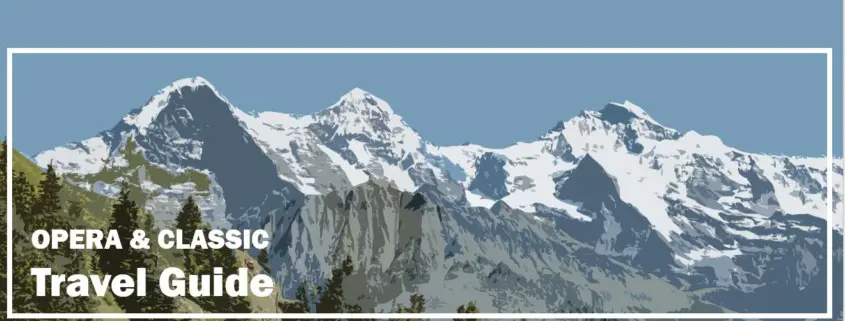


Leave a Reply
Want to join the discussion?Feel free to contribute!